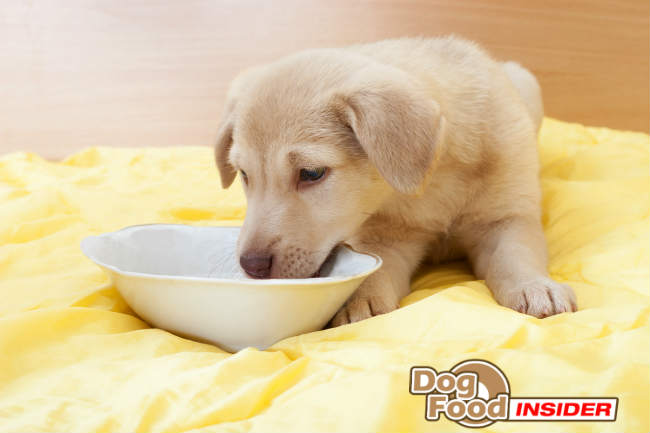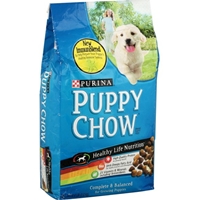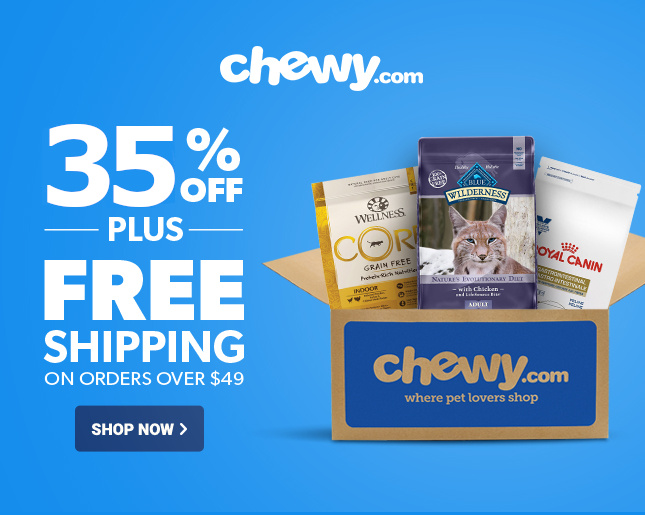
This post may contain affiliate links. We are compensated for referring customers to our affiliate partners.
[su_note note_color=”#ffffff”]
Dog Food Insiders Rating
![]()
1 1/2 PAWS
Company Information
Purina Puppy Chow is made by Nestle Purina Petcare, the largest pet food manufacturer in the world, with global sales of over $12 billion. Purina Petcare, the pet food arm of Nestle, is headquartered in St. Louis, Missouri, where they are a major employer and known as a good corporate neighbor. Purina produces over 30 well-known pet food brands as well as several cat and dog litter products such as Tidy Cat. Purina, as Ralston-Purina, began over 80 years ago producing animal feeds. They sold off their animal feed concern as Purina Mills in the 1990s to Land O’ Lakes and now focus on making pet foods.
Product Overview
Puppy Chow is one of the iconic brands produced by Purina, along with its sister foods Dog Chow, Cat Chow, and Kitten Chow. Dog Chow was introduced in 1957 and Puppy Chow sometime after that as people moved to the suburbs and more people owned pets. These foods remain very popular today, despite the multitude of competitors’ foods and more upscale dog foods for sale today. It is a quintessential grocery store brand – easily identified by basically the same blue packaging for years. Generations of people have probably bought Puppy Chow because that’s what their parents fed their puppy when they were kids. There is enormous name brand recognition and the Purina name is well-respected by these consumers.
A look at the web site for Purina Dog Chow/Puppy Chow shows an emphasis on the dog owning experience and families, and very little information about the food itself which is in keeping with how the food is marketed and who Purina believes buys the food. However, there is some good information on the site about dog ownership and choosing a dog.
Dry Food Products
- Purina Puppy Chow Brand Puppy Food Complete & Balanced
- Purina Puppy Chow Brand Puppy Food Healthy Morsels
- Purina Puppy Chow Brand Puppy Food Large Breed Formula
Review of Purina Puppy Chow Brand Puppy Food Complete & Balanced
Ingredients In Purina Puppy Chow Brand Puppy Food Complete & Balanced
Whole grain corn, corn gluten meal, chicken by-product meal, animal fat preserved with mixed-tocopherols (form of Vitamin E), soybean meal, egg and chicken flavor, brewers rice, barley, animal digest, calcium phosphate, fish oil, calcium carbonate, dried yeast, salt, potassium chloride, choline chloride, L-Lysine monohydrochloride, L-ascorbyl-2-polyphosphate (source of Vitamin C), zinc sulfate, Vitamin E supplement, ferrous sulfate, Yellow 6, DL-Methionine, Yellow 5, manganese sulfate, niacin, Red 40, Vitamin A supplement, Blue 2, copper sulfate, calcium pantothenate, garlic oil, pyridoxine hydrochloride, Vitamin B-12 supplement, thiamine mononitrate, Vitamin D-3 supplement, riboflavin supplement, calcium iodate, menadione sodium bisulfite complex (source of Vitamin K activity), folic acid, biotin, sodium selenite. X-4001
We’ll use the basic Purina Puppy Chow Brand Puppy Food formula for this review since it’s the food most people are probably familiar with if they have ever purchased Puppy Chow.
Ingredients Breakdown
Even a quick look at the first several ingredients will show you that this food has lots and lots of corn and other plant proteins. The first ingredient is whole grain corn, followed by corn gluten meal. Soybean meal is also in the top five ingredients. That’s a lot of plant matter. Of course, it will boost the protein percentage high, which is good for growing puppies, but, without a doubt, puppies who eat this food are going to pass great piles of poop. They will not be able to absorb all of the nutrients in this plant material. Add barley a little later in the ingredients, and this food will make your puppy feel full but it will also mean you will be picking up a lot of waste in the yard. Your puppy might be able to get the nutrients he needs from the chemicals added to the food but they won’t be coming from the ingredients. And, you may have a flatulent, gassy puppy.
As for the meat protein, chicken by-product meal appears within the first five ingredients. By-product meal is high in protein and it’s a named source, so that’s good, but by-products are not as good as whole meats or meals. Still, it’s not too bad. The food also contains animal digest as a meat source. This is an unnamed source so it could come from any kind of animal in any condition. Per AAFCO (the Association of American Feed Control Operatives), animal digest is:
“material which results from chemical and/or enzymatic hydrolysis of clean and undecomposed animal tissue. The animal tissues used shall be exclusive of hair, horns, teeth, hooves and feathers, except in such trace amounts as might occur unavoidably in good factory practice and shall be suitable for animal feed.”
It’s not what most people want to feed their dogs when they think about it, though your dog probably won’t mind. So, the meat proteins in Puppy Chow are not the best.
The food also has animal fat preserved with mixed-tocopherols (form of Vitamin E) in the first five ingredients. Again, this is an unnamed source of animal fat. It could be from any kind of animal rendered down for its fat. However, it is preserved with mixed-tocopherols (form of vitamin E) which is better than using artificial preservatives such as BHA or BHT which have been linked to cancer.
Rendering
With regard to rendering fat, many people recoil in horror as soon as the word “rendering” is mentioned but rendering is a normal part of making dog food regardless of the quality of the food. Even the best, most expensive foods have to use fat from some source and that fat has to be rendered if they use fat from an animal. And fat from an animal is better for your dog. The difference between better dog foods and poor quality dog foods lies in the source of the fat. Does the fat come from a named source such as chicken, for example? The chicken is simply cooked down and the fat is removed – that’s rendering. You can render fat in your kitchen when you cook the fat from foods. On the other hand, if the fat is rendered from a diseased cow combined with roadkill and some dead zoo animals, then you have something altogether less desirable. When you see “animal fat” you don’t know what animals were use to provide the fat for the food. So, “rendering” – perfectly normal process. But it’s important to know the source of the fat.
Quality Of Ingredients
I have warm, fuzzy feelings toward Purina Puppy Chow, Cat Chow, and the like because when I was a kid these really were the best foods around to feed your pets. But times change and today Purina Puppy Chow doesn’t have the quality of ingredients that most dog owners want to feed their puppy. Although Purina explains why they believe in corn and grains on their company web site, and they are good with providing nutrients for dogs even when the ingredients don’t look that good, the ingredients in Puppy Chow really don’t look like something you want to feed your puppy.
AAFCO Statement
One thing you will see on the Dog Chow/Puppy Chow web site is the AAFCO statement. It’s on the page with the Guaranteed Analysis and since it is so prominently displayed I’ll show it here:
“Animal feeding tests using Association of American Feed Control Officials (AAFCO) procedures substantiate that Purina Puppy Chow provides complete and balanced nutrition for all life stages of dogs.”
The AAFCO statement is something that you should look for on every food you consider feeding your dog. The statement will be similar to the one Purina has provided here, though the wording is sometimes a little different. The statement shows that the company has submitted this particular line of foods (not ALL of their foods) to either feeding trials for six months or submitted a nutrient profile to AAFCO to show that the food is “complete and balanced.” Feeding trials are better than a nutrient profile. This statement does not mean that the food is superior but it is the minimum that you should be able to expect from any food you are contemplating feeding your dog. It should be on the label of the food’s package. If the food doesn’t have this AAFCO statement, then something is wrong and you should reconsider the food. Again, this is the bare minimum you should expect from any pet food! They have to be complete and balanced nutritionally. Then you can worry about ingredients and whether the food is natural, holistic, organic, and so on. But it has to be nutritious first.
Special Concerns
There are several special concerns with Purina Puppy Chow. The ingredient list shows that the food has a lot of artificial colorings and dyes. Your dog doesn’t need these colorings. Colorings and dyes are only added to make the food look better to the consumer. What’s more, some people have asserted that some of these dyes are linked to cancers and other illnesses. So, that’s something to be concerned about.
The food also contains menadione sodium bisulfite complex (source of Vitamin K activity) which is synthetic vitamin K3. This ingredient is controversial. Synthetic vitamin K has been banned for human use in some European countries because of its side effects. The FDA has also banned synthetic vitamin K from over-the-counter supplements in the U.S. because of its toxicity. There haven’t been any long-term studies on its impact on dogs despite the fact that many dog food companies are adding it to foods now.
Notable Advantages
There are some nice things in the ingredient list such as fish oil, vitamin E(probably used as a preservative), and garlic oil. The food also avoids using artificial preservatives, which is nice.
Guaranteed Analysis
- Crude protein (min.) 27%
- Crude fat (min.) 12%
- Crude fiber (max.) 5%
- Moisture (max.) 12%
- Linoleic acid (min.) 1.6%
- Calcium (Ca) (min.) 1.1%
- Phosphorus (P) (min.) 0.9%
- Iron (Fe) (min.) 150mg/kg
- Vitamin A (min.) 10,000 iu/kg
- Ascorbic acid* (min.) 70 mg/kg
- Docosahexaenoic acid* (DHA)(min.) 0.05%
*Not recognized as an essential nutrient by the AAFCO Dog Food Nutrient Profiles.
Purina Puppy Chow has 27 percent (Min) protein which is an adequate percentage for growing puppies but most of it seems to come from corn and other grains which can be hard for dogs and puppies to digest. Growing puppies need 28 percent protein, so the food is a little lacking in this area.
Puppy Chow says it has 12 percent fat (Min) and the recommended amount is 17 percent fat for growing puppies. The 12 percent figure is a minimum, but the food still seems lacking.
The food shows 5 percent fiber which is a little high – probably due to so much corn and other grains in the first several ingredients. This is a lot of fiber for a puppy and you will be picking up a lot of waste if you feed this food.
Calorie Content Metabolizable Energy (ME): 431 kcal/cup
Company Reputation And Quality Control Issues
Purina has a very good reputation as a manufacturer. They seem to run their plants well with good quality control measures. They rarely have recalls. As a company that has been in business for over 80 years and as the largest pet food manufacturer in the world, they seem to know what they’re doing with regard to producing pet food – whether you like their foods or not.
Bottomline
Purina Puppy Chow Brand Puppy Food Complete & Balanced is an old-time favorite with many people and it’s been around for decades. At one time it was probably the best food available for puppies but today there are many better puppy foods.

Purina Puppy Chow Dog Food has earned our 1.5 paw rating.
Help Support This Site And Get Pet Food Delivered To Your Doorstep!
Buy your dog food with the convenience of Chewy.com and help support this website at the same time! If you click on any of the Chewy.com links or banners on this website, and then make a purchase (no matter what you buy), we receive a small commission on your entire purchase! How cool is that?! We would really appreciate your support and every penny earned through our Chewy commission helps to improve this site and add even more dog food reviews. 🙂
(We Are Incredibly Thankful For Your Support!)
From Purina Puppy Chow Dog Food Review To All Dog Food Reviews



